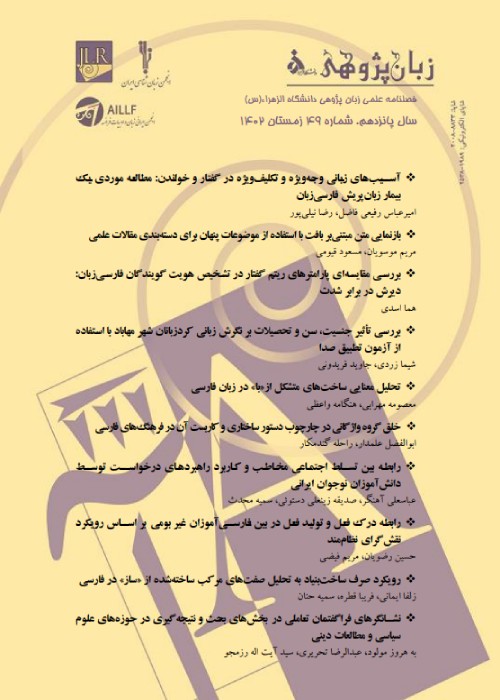Ideological Investigation of Interpretation of Iranian president’s Speech in the UN: English Interpretation of Presstv Channel of Iran and France 24 of France
Life of people is so interrelated with language that it is not imaginable without it. The effect of language on social, political and cultural life seems to be undeniable as it is observed in many daily events. Besides, translators and interpreters are surrounded with thoughts, beliefs and ideologies and do their task of changing a source language to a target one under their influence, consciously or unconsciously. This is evident in the performance of translators and interpreters who work in various media and must obey dominant ideologies of their workplaces and this can affect the macro/micro-strategies utilized by them in their jobs. Translation and interpretation as two processes that require rewriting have sufficient background for distancing themselves from reality and facts and guiding mindsets towards a specific direction. Indeed, translation is regarded as a mirror that does not reflect light, but produces it. This means that novel ideologies are produced in translation task. The fact that dominant ideology belongs to dominant classes in majority of societies causes us to seek ways and approaches that help to consolidate and reinforce this ideology. Each translator and interpreter tries to impose their ideology through some realities and facts, consciously or unconsciously. The imposed ideology may not work systematically and consistently in conducting personal translation projects, but when such projects are administered in the media that belong to dominant ideologies it seems that translators’ minds are consciously involved in stabilizing the prevailing hegemony. Ideology is a subject that requires particular attention paid by researchers of translation studies. Lots of theoreticians have even claimed that translation is a conflict point for ideologies and each translation is ideological. Ideology itself is a combination of action-oriented beliefs and regarding the relation between ideology and translation, it can be indicated at each level of translation process that if linguistic considerations come to conflict with ideological ones, the latter win. Translation or interpretation is not just transferring meaning from a language to another and can have a considerable share among rival ideologies. Translation and interpretation are ideological-wise since they can import a collection of values and beliefs (relating to historical eras and social positions) to a target culture. In line with serving domestic interests of target languages, translation or interpretation chooses an ideological solution for linguistic and cultural differences of a source text. Even some theorists have discussed the interaction between ideology and translation and believe that ideology has an important role in translation act and due to the fact that translation and interpretation serve political aims, they affect the choice of texts for translation, translation strategies and propagation of some translated texts. Translation is also considered as the most influential form of rewriting because it can be an indicator of a writer’s image and their works in another culture and can move them beyond cultural borders. Therefore, translation can be utilized as a tool for expressing a translator’s approval or disapproval of any ideology. Indeed, translation means creating new readership for a source text. This article aimed to investigate the controversial and contentious relation between translation and ideology regarding simultaneous English interpretation of Iranian president Hassan Rouhani’s speech in the UN in 2017 conducted in Press TV channel of Iran and France 24 channel of France in order to clarify whether ideology of these interpreters affected the interpretations or not. This speech was aired in numerous international TV channels as it was considered as a response to American President, Donald Trump’s speech against Iran in the UN the earlier day and many channels interpreted Iranian president’s speech simultaneously due to its significance and sensitivity. To this end, their interpretations were compared to each other, utilizing Critical Discourse Analysis and Van Dijk’s theoretical background. The results of this study indicated that both interpretations carried out by these news channels were intentionally or unintentionally under the influence of their respective ideologies. Ideological differences of investigated interpretations prove the fact that France 24 interpreter has deleted or added some parts of Iranian president’s speech and it might be caused by increasing reinforcement of Iranphobia by Western news channels, while the interpreter of Press TV channel has tried his best to remain loyal to contents of the speech and highlight ideas and comments of Rouhani with possible minor alterations. Consequently, the results of this study can confirm the existence of ideological conflicts between Iran and Western countries and these differences might be caused by ideological backgrounds of these two interpreters. As Nord (2003) believes, any decision making in translation is consciously or unconsciously affected by ideological criteria.
- حق عضویت دریافتی صرف حمایت از نشریات عضو و نگهداری، تکمیل و توسعه مگیران میشود.
- پرداخت حق اشتراک و دانلود مقالات اجازه بازنشر آن در سایر رسانههای چاپی و دیجیتال را به کاربر نمیدهد.


